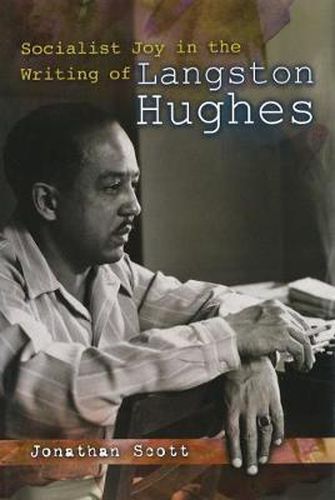Readings Newsletter
Become a Readings Member to make your shopping experience even easier.
Sign in or sign up for free!
You’re not far away from qualifying for FREE standard shipping within Australia
You’ve qualified for FREE standard shipping within Australia
The cart is loading…






One of the foremost African American writers of his generation, Langston Hughes waged a tireless campaign against racial oppression that defied the anti-communist currents of cold war America.
Socialist Joy in the Writing of Langston Hughes
examines his writing during this period to show that his approach to the main philosophical currents of the era was original, dynamic, and systematic in ways that most scholars have yet to appreciate. Jonathan Scott has written the first book-length study to analyze the extraordinary range of Hughes’ creative output, showing that his unassailable reputation as one of America’s finest
folk poets
barely scratches the surface of his oeuvre. Scott offers a robust account of the relations between Hughes and political activism to show that Hughes’ direct involvement with the U.S. socialist movement of the 1920s and ‘30s was largely responsible for the variety of his writing. Scott also contends that the goal of overthrowing white oppression produced a
socialist joy
that would express itself repeatedly in Hughes’ work during the anticommunist crusades of the 1950s and ‘60s. In his provocative study, Scott explores four areas of Hughes’ intellectual work: his relationship with Afro-Caribbean arts, Soviet Russia, and the Harlem Renaissance; his postwar newspaper writing for the African American press; his extensive cultural work as an anthologist; and his writings for young people. Through these analyses, Scott proposes the concept of
red, white, and black
as an alternative paradigm for appreciating Hughes in particular and the American scene in general. Scott views Hughes not simply as a great author but as an American working-class intellectual trickster whose eccentric projects require a redefinition of the very concept of authorship. And by focusing on Hughes’ intellectual method, Scott also contests the notion of reducing all African Americans to one undifferentiated social status beneath that of any class within the white oppressing group - a hallmark of racial oppression that has diminished, in the U.S. academy, Hughes’ international status. As Scott persuasively argues, it is only through an understanding of Hughes’ literary method that we can undertake a thorough account of his prolific production during the cold war era. His book situates Hughes’ life and work in their proper contexts, both reconfirming his reputation as an intellectual of the American left and establishing his long-denied place in American studies as the most well-rounded writer of his time.
$9.00 standard shipping within Australia
FREE standard shipping within Australia for orders over $100.00
Express & International shipping calculated at checkout
One of the foremost African American writers of his generation, Langston Hughes waged a tireless campaign against racial oppression that defied the anti-communist currents of cold war America.
Socialist Joy in the Writing of Langston Hughes
examines his writing during this period to show that his approach to the main philosophical currents of the era was original, dynamic, and systematic in ways that most scholars have yet to appreciate. Jonathan Scott has written the first book-length study to analyze the extraordinary range of Hughes’ creative output, showing that his unassailable reputation as one of America’s finest
folk poets
barely scratches the surface of his oeuvre. Scott offers a robust account of the relations between Hughes and political activism to show that Hughes’ direct involvement with the U.S. socialist movement of the 1920s and ‘30s was largely responsible for the variety of his writing. Scott also contends that the goal of overthrowing white oppression produced a
socialist joy
that would express itself repeatedly in Hughes’ work during the anticommunist crusades of the 1950s and ‘60s. In his provocative study, Scott explores four areas of Hughes’ intellectual work: his relationship with Afro-Caribbean arts, Soviet Russia, and the Harlem Renaissance; his postwar newspaper writing for the African American press; his extensive cultural work as an anthologist; and his writings for young people. Through these analyses, Scott proposes the concept of
red, white, and black
as an alternative paradigm for appreciating Hughes in particular and the American scene in general. Scott views Hughes not simply as a great author but as an American working-class intellectual trickster whose eccentric projects require a redefinition of the very concept of authorship. And by focusing on Hughes’ intellectual method, Scott also contests the notion of reducing all African Americans to one undifferentiated social status beneath that of any class within the white oppressing group - a hallmark of racial oppression that has diminished, in the U.S. academy, Hughes’ international status. As Scott persuasively argues, it is only through an understanding of Hughes’ literary method that we can undertake a thorough account of his prolific production during the cold war era. His book situates Hughes’ life and work in their proper contexts, both reconfirming his reputation as an intellectual of the American left and establishing his long-denied place in American studies as the most well-rounded writer of his time.